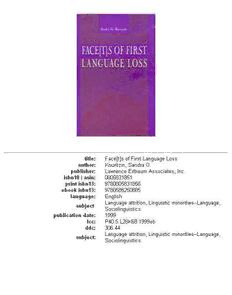
Faces of first language loss PDF
01999·0.446 MB·English
Most books are stored in the elastic cloud where traffic is expensive. For this reason, we have a limit on daily download.
Preview Faces of first language loss
Description:
This book contributes to the understanding of first-language loss in both immigrant and indigenous communities in (at least) three ways. First, it provides insight into the process of language loss and the factors contributing to it. Second, it attempts to define, from an insider perspective, what it means to "lose" a language. Third, it analyzes the perceived consequences of first language loss in terms of social, academic, emotional, and economic factors--an approach previously lacking in research on language loss. Most studies of first language loss are impersonal, even when they tell emotional stories. This polyphonic book about language loss and imperfect learning of heritage languages tells the inside story. Easy to read and yet academic, it gives voice to five different storytellers who relate the histories of their first language loss and analyzes themes from 21 life-history case studies of adults who had lost their first languages while learning English. The stories in this book make a compelling argument that heritage languages should be preserved, that ESL should be about developing bilinguals not English monolinguals. Important reading for researchers, practitioners, and graduate students in ESL and bilingual education, multicultural education, cultural studies, and sociology, this book will also interest qualitative researchers as an example of a unique form of both doing and writing research.
See more
The list of books you might like
Most books are stored in the elastic cloud where traffic is expensive. For this reason, we have a limit on daily download.
